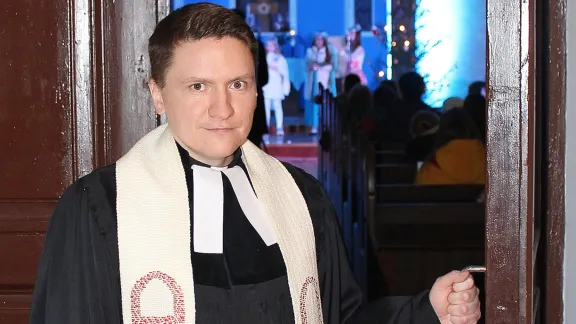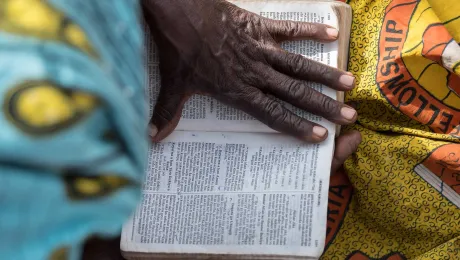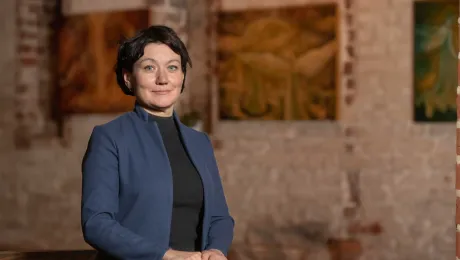
Pastor Vladimir Tatarnikov at the door of St. Johnâs Lutheran Church in Grodno, Belarus. Photo: Oleg Shreders
Voices from the Communion: Pastor Vladimir Tatarnikov
(LWI) - Vladimir Tatarnikov is the only pastor for the Evangelical-Lutheran congregations in the whole of Belarus. Since the presidential elections in August 2020, the country has seen continuous protests. One of the congregations Tatarnikov serves is in Grodno, which lies in western Belarus, near the Polish and Lithuanian borders.
Looking back on the past months, Tatarnikov shares his experiences and insights into the role of the Lutheran church in this country.
What was the situation in August 2020, shortly after the presidential elections?
Mass protests against the allegedly rigged elections began and security forces responded with arrests and house searches all over the country. Here in Grodno, the Lutheran, Roman Catholic, and Orthodox churches opened their doors to protesters to find shelter.
St. John’s Lutheran Church is in the center of Grodno. Right next to the church is the central police station for the city and district. All the churches in the city, including ours, rang their bells. It was our ecumenical appeal to the police not to beat the protesters. It was necessary because the people out in the city, whether on their way home or walking, were beaten and arrested by security services. The churches were open for all those seeking protection and, of course, for prayer.
Continued protests in Belarus were reported in the following months. What is the situation today?
Yes, the protests continue. Since August, about 30,000 people have already been arrested or imprisoned. Many more were fired from their jobs or expelled from universities. All because of their political convictions.
We have Lutheran communities in several cities across the country. In our congregation in the capital city, Minsk, for example, we currently do not have regular services because the metro is closed, and traffic in the city center is blocked during the protests. With conditions as they are, someone might go to the shop to buy bread and end up spending the night in prison.
Please tell us something about the history of the Lutheran church in Belarus.
The biggest church in Belarus is the Orthodox church, followed by a small Roman Catholic church. Our Evangelical Lutheran Church is a tiny minority church and has a complicated history. Before the Second World War, the congregation in Grodno belonged to the consistory in Warsaw. After the war, the communist regime dissolved the congregation, and the church building was used as a city archive. All Lutherans were deported to Kazakhstan or Kyrgyzstan under Stalin. Today we have congregations in Minsk, Vitebsk, and Grodno. Here we also have the only Lutheran church building in the country.
What is the current relation between your church and state authorities?
We maintain good relations with the mayor of Grodno, but there are certain obstacles in the country. We are not a church in the legal sense because we have too few congregations. We are not allowed to invite foreign pastors to services, not even from Russia, nor can we enter into agreements with representatives of other Lutheran churches from abroad on Belarusian territory. Also, any help, be it financial or material, must be reported to the appropriate offices. The type of support we may accept is restricted. When our sisters and brothers from abroad donate money to pay for electricity and water bills, 18 percent is charged for taxes. Also, all events that are not church services, for example, concerts, must be approved by the city administration.
At a national level: How is the Lutheran church organized?
Most of our parishioners are Belarusians who joined the Lutheran church because they are interested in the message of the Reformation. We also have a German, an Estonian, and a Finnish branch. We feel spiritually connected with the Federation of Evangelical Lutheran Churches in Russia and Other States. Through that, we are affiliated with The Lutheran World Federation.
I am the only parish pastor in the whole country. Also, there are two deacons in Grodno and Vitebsk. Slowly but surely, we are planning to establish more congregations.
What does it mean for your church to be a part of The Lutheran World Federation?
First, I would like to say a big thank you to all our brothers and sisters in faith. We received many letters, emails, and messages with words of support. Thank you for your prayers. They are very important to us.
Our country is facing three crises all at once: there is an economic crisis, there is a political crisis, and there is the Coronavirus disease (COVID-19) pandemic. We do not know what the future will bring. Nobody could have imagined these developments in Belarus six months ago in August 2020.
What gives us strength is the support of churches from the global Lutheran communion. We are a small church in Belarus, but we feel your prayers! Many thanks to everyone who helps people in Belarus through our church.
LWF/A. Weyermüller
The Lutheran World Federation is a global body that shares the work and love of Christ in the world. In this series, we profile church leaders and staff as they discuss topical issues and set out ideas for building peace and justice in the world, ensuring the churches and communion grow in witness and strength.


